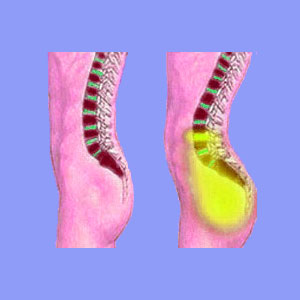
Genetic sciatica describes an in-born predisposition towards developing lower body radiculopathy symptoms due to the inheritance of certain genes. Many readers write to us and report that they have the same type of sciatica that one or both parents had suffered. Some of these patients even cite statistics showing sciatica affecting multiple generations in their family lineage, with similar or identical expressions.
We know that much of our physical and mental attributes are passed down through time in our genetic coding. However, some patients do not understand how genetics can play definitive roles in sciatica pain syndromes. Therefore, we offer this essay to answer many of the common questions that we receive regarding the possibility of developing sciatic nerve symptoms based on hereditary factors.
Genetic Sciatica Definition
Genetics refers to the genes that are passed from mother and father to child. In essence, we are discussing an inherited pain condition that affects multiple generations in sequence.
Chronic pain patients, regardless of what type of symptoms they endure, often cite evidence that a parent or grandparent suffered a similar condition.
Genetic makeup influences our physical bodies and can pass along the predisposition towards developing similar structural spinal issues as our ancestors. However, genetics also influences our personality makeup and can leave us predisposed towards mindbody health issues that might also have affected our parents, grandparents and distant historical relatives.
Sciatica from Genetic Spinal Structure
The anatomy is greatly influenced by genetic design. This includes every part of us and the dispositions of these individual components of our whole selves. The spine is certainly no exception to this rule.
Since genetics pass both desirable and undesirable characteristics forward in our lineage, it is common for people to inherit the tendency towards developing many of the same structural factors that can cause sciatica. These attributes include any of the following considerations:
Degenerative disc disease is certainly an inherited trait. People will likely pass along their tendency towards general or location-specific disc deterioration to their offspring.
The tendency towards developing intervertebral herniations might be a genetic marker. Many patients cite that their parents had identical herniations, possibly caused by structural irregularities or tissue tendencies that might be encoded into their genetics.
Osteoarthritis is a genetic condition, with subsequent generations showing an increased risk when one or both parents demonstrate symptoms.
Atypical spinal curvatures, such as lordosis, kyphosis and scoliosis might be passed along genetically.
Likewise, structural abnormalities in the vertebral bones, such as spondylolisthesis, transitional vertebra, sacralized vertebra and hemi-vertebrae might be linked to the incidence of sciatica and may also be inherited bodily traits.
Inherited Sciatica from General Health Concerns
Sciatica can be caused by purely anatomical reasons that do not relate to the spine. Although in these cases, the proper terminology for the symptoms is really pseudo-sciatica.
Muscular irregularities, such as abnormalities affecting the piriformis muscle, might cause sciatic nerve problems and may also be passed down genetically.
The tendency towards diabetes might increase the chances of suffering diabetic neuropathy, which is commonly mistaken for true sciatica.
The predisposition towards certain cancers or benign tumor formations can also cause sciatica and may be linked to identifiable genetic markers.
Genetic Sciatica from Personality Structure
Many cases of sciatica do not originate from anatomical issues. Instead, they are caused by a mindbody process, also known as a psychogenic causation. Many distinct personality traits have been identified which are known to contribute to an increased incidence of mindbody symptomology. It is also no coincidence that most of these personality traits can be passed genetically from parent to offspring.
When children become virtual carbon copies of their parents and grandparents from a psychological perspective, they are now predisposed towards developing the same physical manifestations of suppressed and repressed emotional phenomenon as their ancestors did. In fact, the way the modern medical system operates, ever-increasing nocebo factors will actually exacerbate these pain-inducing traits with each subsequent generation.
In summary, while it is not easy to ascertain the exact reason why specific genetic codes pass along the tendency towards sciatica, and many forms of back and neck pain, it is safe to say that the occurrence does happen often.
For more information about identifying the potential reasons why sciatica runs in your family, consider talking to your physician or looking for mutually identifying genetic factors in cases that affect family members. Just remember to account for both physical and psychological traits, for best results.





